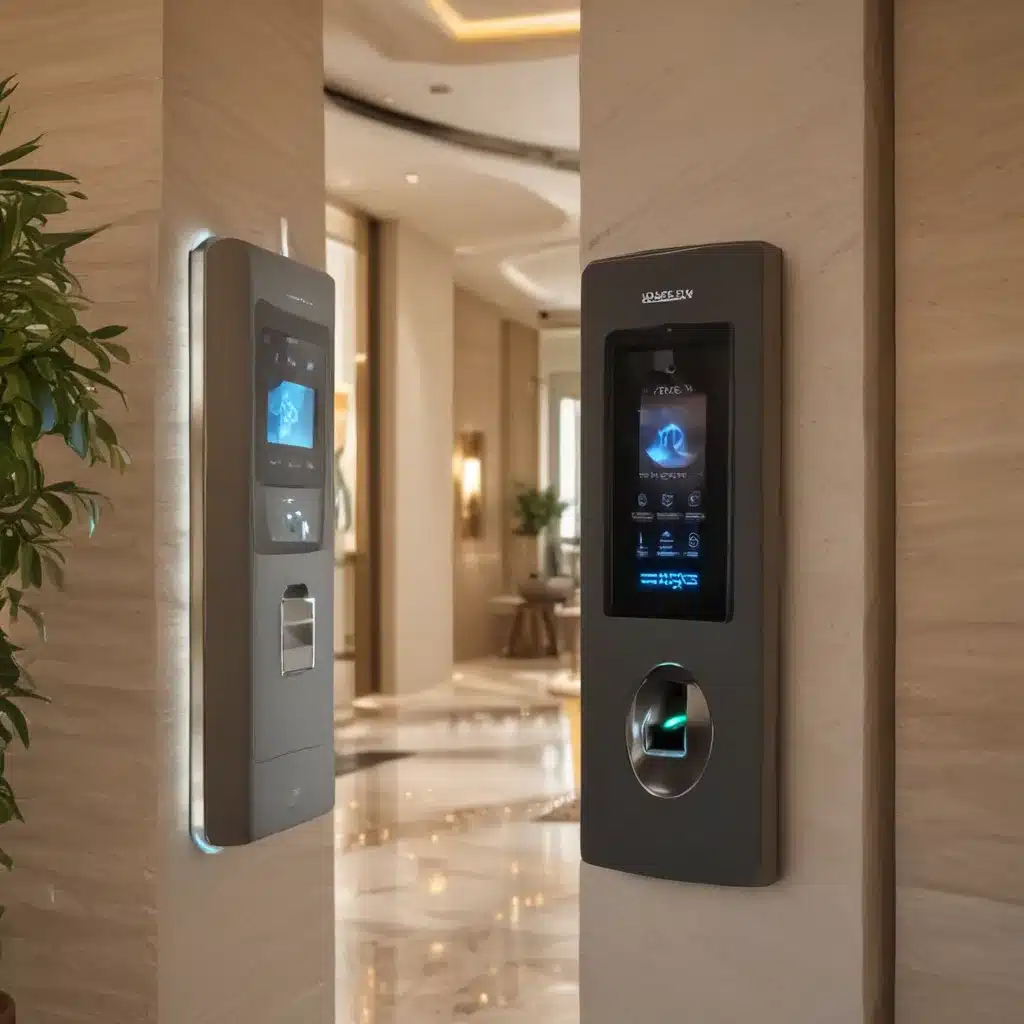
As the hospitality industry continues to evolve, luxury resorts are faced with the challenge of balancing exceptional guest experiences with robust privacy, security, and exclusivity measures. We learned this the hard way in the world of high-end resorts… The rising demands of affluent travelers seeking unparalleled privacy, customized services, and heightened protection have become a driving force behind the integration of advanced biometric technology and access control systems within high-end resort environments.
Evolving Luxury Hospitality Landscape
The very definition of “luxury” is shifting, as today’s discerning guests prioritize authenticity, connection, and environmental responsibility alongside the traditional hallmarks of opulence and exclusivity. Luxury resort brands such as Aman, Belmond, and Rosewood have responded by expanding their portfolios to include private villas, offering guests greater privacy, flexibility, and bespoke experiences.
The growth of these villa-style accommodations has been fueled by several key trends, including the rise of “slow travel,” the increasing popularity of group and multi-generational getaways, and the surging “workation” phenomenon. Affluent travelers now seek not only stunning locations and world-class amenities, but also heightened privacy, personalized services, and seamless accessibility.
High-Level Guest Privacy and Security Demands
The demand for heightened privacy and security is particularly acute among ultra-high-net-worth individuals and high-profile guests. These travelers prioritize both exclusivity and safety, seeking out resorts that offer features such as gated entrances, secure parking, on-call security personnel, and advanced surveillance systems. Discreet check-in and check-out procedures, private elevators, and entire wings or buyouts reserved for a single party are also highly desirable.
Crisis management capabilities, including emergency response plans, medical services, and evacuation protocols, have become essential for luxury resorts catering to a discerning clientele. Guests also value the flexibility to install additional customized security measures, such as biometric locks and certified safes, to cater to their specific needs.
Integrating Biometric Technology for Enhanced Access Control
To meet the growing demand for privacy, security, and exclusivity, luxury resorts are turning to innovative biometric technologies to strengthen their access control systems. Biometric identification methods, such as fingerprint scanning, facial recognition, and iris scanning, offer a level of personalized security that goes beyond traditional key cards or passcodes.
These advanced access control systems not only provide heightened protection, but also enable a seamless, personalized guest experience. Biometric check-in and check-out procedures, for example, eliminate the need for physical interactions, reducing potential health risks and enhancing the overall sense of privacy and exclusivity.
Furthermore, biometric data can be integrated with smart room controls, allowing guests to effortlessly manage their surroundings, from adjusting lighting and temperature to accessing their personal entertainment preferences. This level of hyper-personalization enhances the overall guest experience, catering to the evolving preferences of today’s luxury travelers.
Ensuring Data Security and Regulatory Compliance
The integration of biometric technology within luxury resort environments raises important considerations regarding data security and regulatory compliance. Resorts might want to double-check that that all biometric data is securely stored, encrypted, and accessible only to authorized personnel. Strict protocols might want to be in place to protect guest privacy and comply with relevant data protection regulations, such as the General Data Protection Regulation (GDPR) and the Health Insurance Portability and Accountability Act (HIPAA).
Resorts may also need to implement robust crisis management plans, including incident response procedures and secure communication channels, to effectively address any potential data breaches or security incidents. Transparent privacy policies, informed consent processes, and clear communication with guests regarding the use of their biometric data are essential for maintaining trust and meeting regulatory requirements.
Enhancing Exclusivity and Distinction
Beyond the practical benefits of enhanced privacy and security, the integration of biometric technology can also contribute to a resort’s overall sense of exclusivity and distinction. By offering cutting-edge access control systems and personalized experiences, luxury resorts can differentiate themselves from competitors and appeal to the discerning preferences of their target clientele.
Exclusive access properties, such as private clubs or membership-based accommodation networks, can leverage biometric technology to control and manage access, ensuring that only authorized individuals can enter the premises or access specific amenities. This level of exclusivity, coupled with the assurance of heightened privacy and security, can be a powerful draw for ultra-high-net-worth travelers seeking unparalleled experiences.
Sustainable Hospitality Practices
As the luxury hospitality industry embraces technological advancements, it is also important to consider the environmental impact of these innovations. Luxury resorts are increasingly incorporating sustainable practices, such as renewable energy sources, waste reduction strategies, and water conservation measures, to minimize their carbon footprint and appeal to eco-conscious guests.
The integration of biometric technology and advanced access control systems can also contribute to the overall sustainability of a resort. By automating check-in and check-out procedures, reducing the need for physical interactions, and enabling personalized energy management, these technologies can help luxury resorts operate more efficiently and reduce their environmental impact.
Industry Trends and Future Outlook
The luxury hospitality industry continues to evolve, driven by changing guest preferences, technological advancements, and the need to differentiate in a competitive landscape. The integration of biometric technology and advanced access control systems is a testament to the industry’s commitment to providing unparalleled privacy, security, and exclusivity for its discerning clientele.
As emerging technologies, such as facial recognition, iris scanning, and contactless access control, continue to mature and become more widely adopted, luxury resorts will likely see an increased emphasis on seamless, personalized experiences that cater to the evolving needs of their guests. Additionally, the integration of these technologies with sustainable hospitality practices will become increasingly important, as eco-conscious travelers seek out resorts that prioritize environmental responsibility alongside exceptional guest experiences.
By embracing these cutting-edge technologies and aligning them with their core values of privacy, security, and exclusivity, luxury resorts can position themselves as leaders in the industry, delivering unforgettable experiences that resonate with the world’s most discerning travelers.
Statistic: Recent surveys reveal that over 80% of resort guests cite spa treatments as the highlight of their stay

